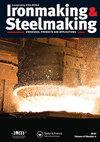Viscosity and structure of CaO–Al2O3–TiO2-based mold fluxes with various CaO/Al2O3 mass ratios
IF 2.2
3区 材料科学
Q2 METALLURGY & METALLURGICAL ENGINEERING
引用次数: 0
Abstract
ABSTRACT The effects of CaO/Al2O3 mass ratio on the viscosity and structure of new CaO–Al2O3–TiO2-based fluorine-free mold fluxes for high titanium steel are investigated by viscometer, molecular dynamics (MD) simulations and Raman spectroscopy. When the CaO/Al2O3 mass ratio increased from 0.6 to 1.4, the viscosities and activation energies reduced from 0.43 to 0.10 Pa·s and 127.8–74.2 kJ·mol−1, respectively. While the break temperatures raised from 1385 to 1507 K. Moreover, according to MD simulation results, the concentration of high coordination of Al–O and Ti–O bonds decreased, and the complex structure units of Q3, Q4 and Q5 turned to the simple structure units of Q0, Q1 and Q2. Raman spectra suggested that the concentrations of Ti–O–Ti(Al) linkage and Q2(Si-O−) decreased significantly, but the concentration of Q1(Si–O−) increased. Therefore, CaO/Al2O3 could simplify the network structure and decrease the viscosity of new CaO–Al2O3–TiO2-based fluorine-free mold fluxes for high titanium steel.不同CaO/Al2O3质量比的CaO–Al2O3–TiO2基模具助熔剂的粘度和结构
摘要通过粘度计、分子动力学(MD)模拟和拉曼光谱研究了CaO/Al2O3质量比对新型CaO–Al2O3–TiO2基高钛钢无氟保护渣粘度和结构的影响。当CaO/Al2O3质量比从0.6增加到1.4时,粘度和活化能从0.43降低到0.10 Pa·s和127.8–74.2 kJ·mol−1。而断裂温度从1385上升到1507 K.此外,根据MD模拟结果,Al–O和Ti–O键的高配位浓度降低,Q3、Q4和Q5的复杂结构单元转向Q0、Q1和Q2的简单结构单元。拉曼光谱表明,Ti–O–Ti(Al)键和Q2(Si-O−)的浓度显著降低,但Q1(Si–O−)的含量增加。因此,CaO/Al2O3可以简化高钛钢新型CaO–Al2O3–TiO2基无氟保护渣的网络结构,降低其粘度。
本文章由计算机程序翻译,如有差异,请以英文原文为准。
求助全文
约1分钟内获得全文
求助全文
来源期刊

Ironmaking & Steelmaking
工程技术-冶金工程
CiteScore
3.70
自引率
9.50%
发文量
125
审稿时长
2.9 months
期刊介绍:
Ironmaking & Steelmaking: Processes, Products and Applications monitors international technological advances in the industry with a strong element of engineering and product related material. First class refereed papers from the international iron and steel community cover all stages of the process, from ironmaking and its attendant technologies, through casting and steelmaking, to rolling, forming and delivery of the product, including monitoring, quality assurance and environmental issues. The journal also carries research profiles, features on technological and industry developments and expert reviews on major conferences.
 求助内容:
求助内容: 应助结果提醒方式:
应助结果提醒方式:


